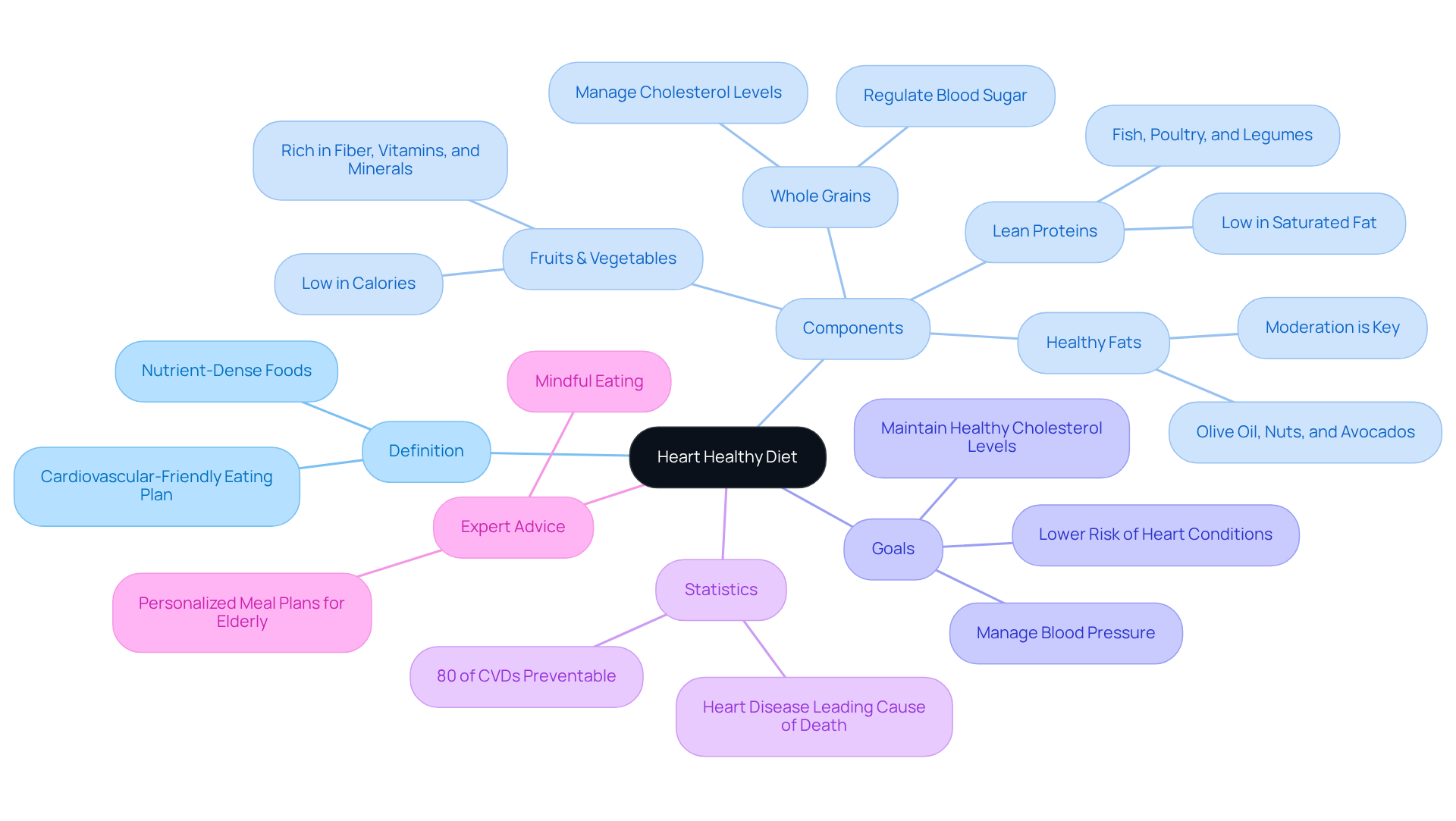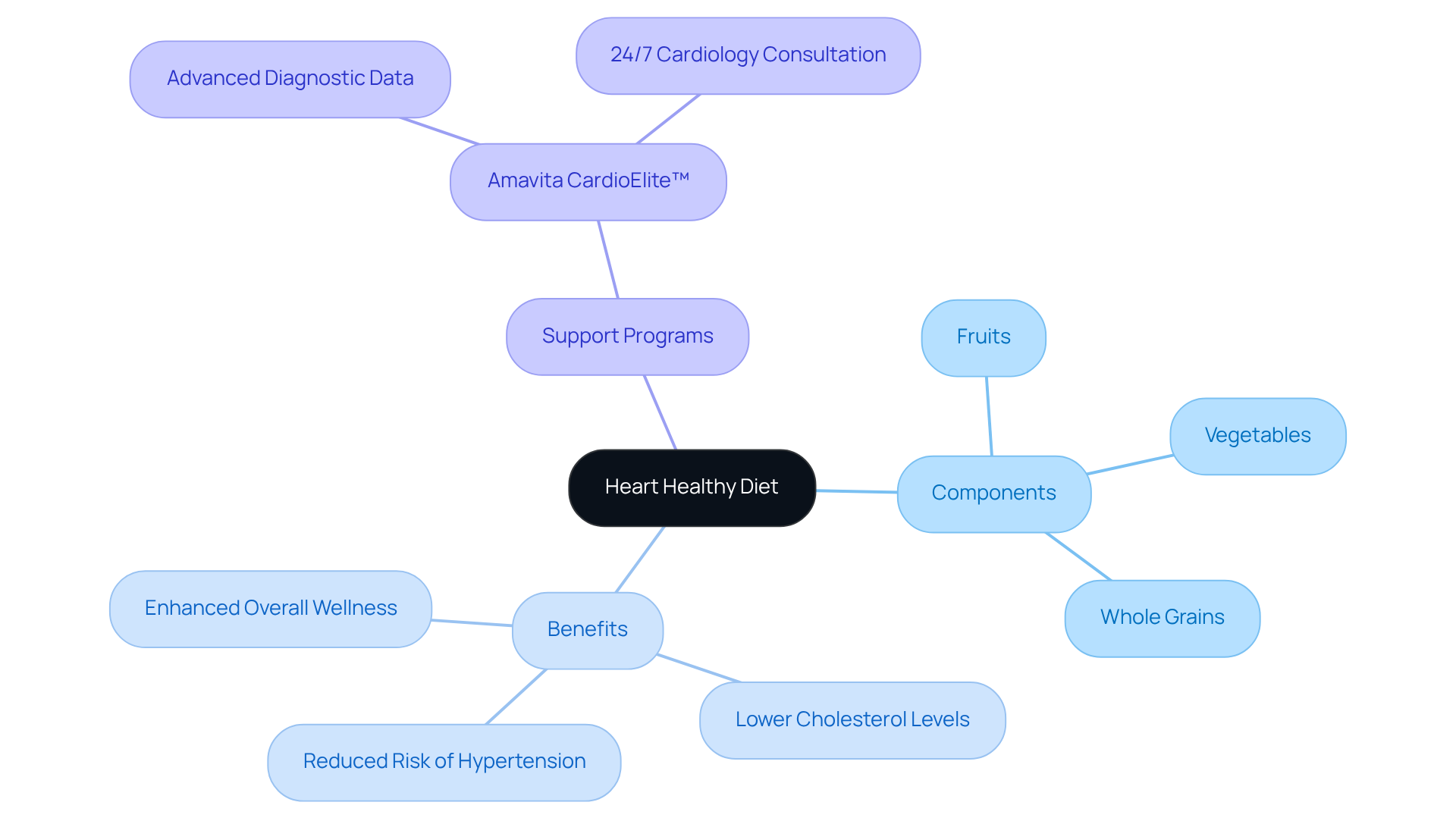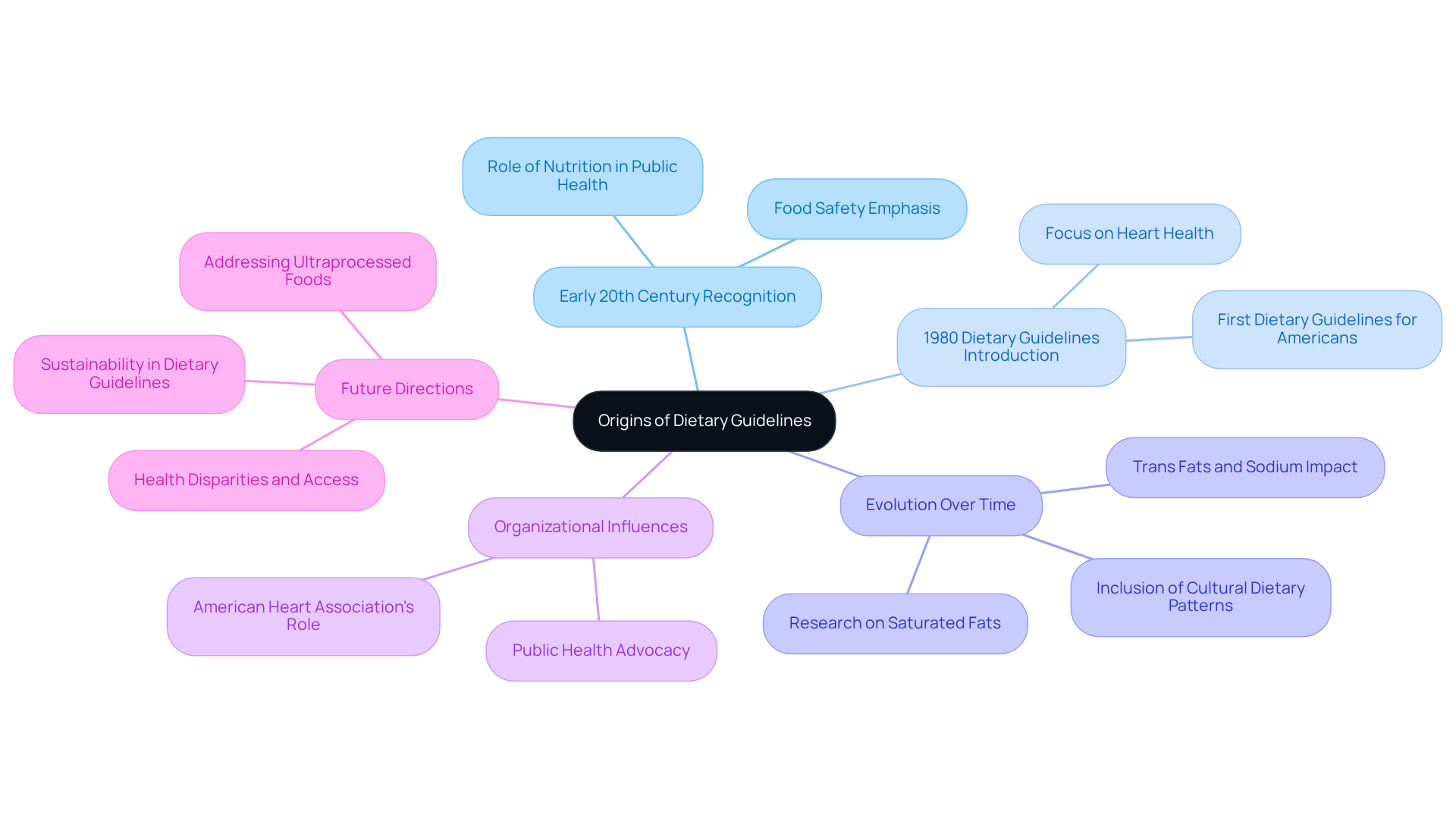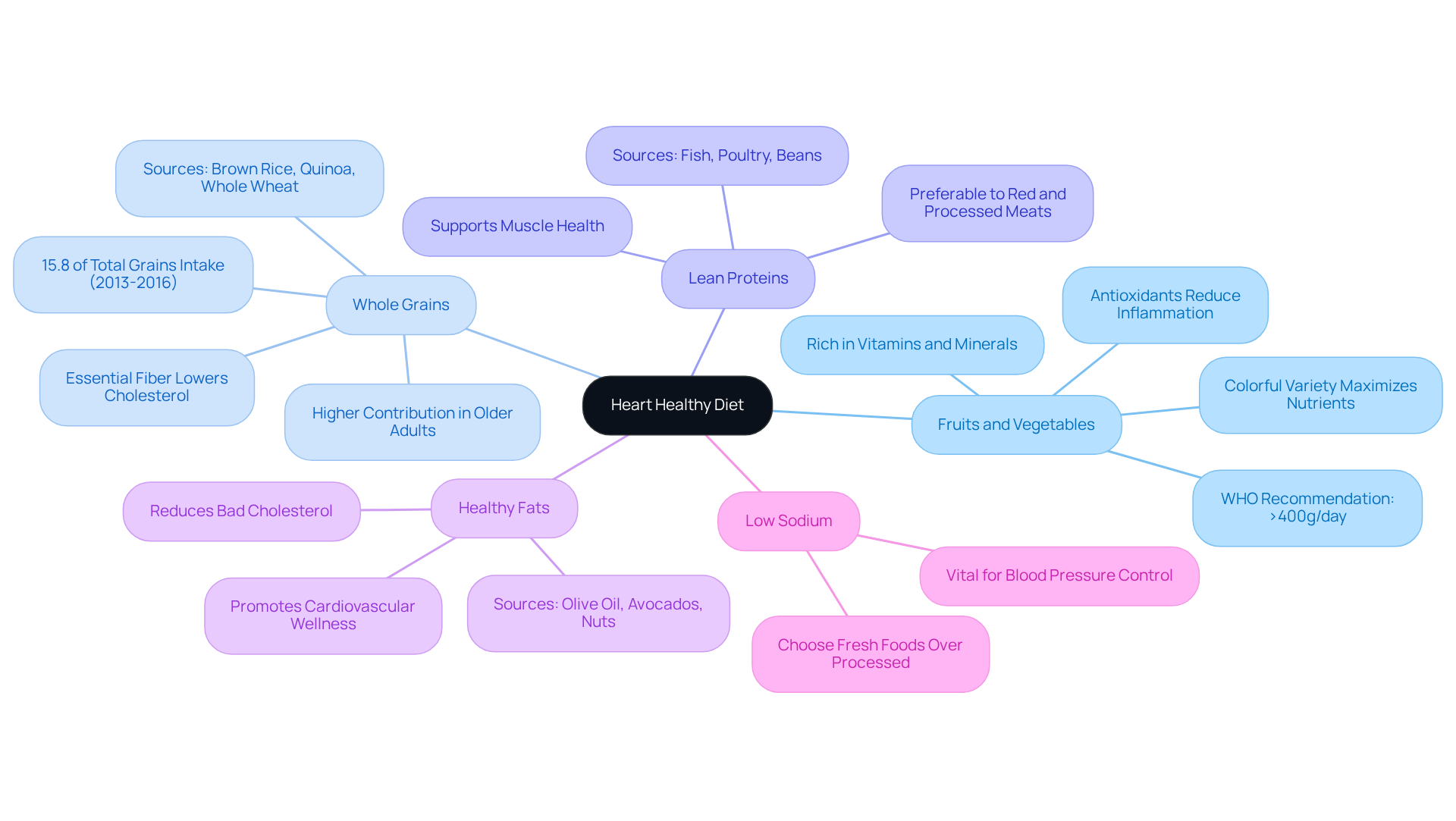


A heart-healthy diet is essential for nurturing your well-being, focusing on nutrient-dense foods like:
By gently limiting:
you can enhance your cardiovascular health. Have you considered how these dietary choices can play a significant role in preventing cardiovascular diseases? This diet not only helps manage risk factors such as hypertension and cholesterol levels, but also promotes a sense of overall well-being.
Remember, making these changes can feel overwhelming, but you are not alone in this journey. Support is available, and taking small steps can lead to lasting benefits for your health.
In today's world, where cardiovascular diseases are increasingly prevalent, understanding the intricacies of a heart-healthy diet becomes essential. It's important to recognize that many of these conditions are preventable through thoughtful dietary choices. This nutritional approach encourages the incorporation of nutrient-dense foods while advocating for the reduction of harmful ingredients, ultimately aiming to enhance overall cardiovascular health. Yet, with the overwhelming amount of conflicting information available, how can you navigate your dietary options with confidence to truly support your heart health?
We understand that this can be a daunting task. The journey toward a healthier lifestyle is often filled with questions and uncertainties. However, rest assured that you are not alone in this endeavor. By taking small, informed steps, you can make choices that positively impact your heart health. Together, we can explore these options and find a path that feels right for you.
What is a heart healthy diet? It is an essential nutritional strategy that consists of a cardiovascular-friendly eating plan designed to enhance cardiovascular health. By focusing on nutrient-dense foods, this approach helps to reduce the risk of related health issues. Typically, this diet includes a vibrant variety of fruits, vegetables, whole grains, lean proteins, and healthy fats, while carefully limiting saturated fats, trans fats, sodium, and added sugars. The primary goals are to lower the risk of heart conditions, effectively manage blood pressure, and maintain healthy cholesterol levels.
Did you know that approximately 80% of cardiovascular diseases (CVDs) are preventable by adopting a healthier lifestyle? This statistic underscores the importance of raising awareness and educating ourselves about our dietary choices. For elderly patients, effective heart-healthy nutrition programs often include personalized meal plans that emphasize whole foods and mindful eating habits, providing a supportive framework for better health.
Key features of a heart-healthy diet include:
Nutritionists remind us that every food choice we make can either promote health or contribute to illness. As Dr. Leslie Cho wisely states, "Cardiovascular issues are 90 percent manageable - anyone can avoid cardiovascular problems anywhere globally, particularly by consuming foods that are low in salt and cholesterol, exercising regularly, and refraining from smoking." This perspective reinforces the notion of what is a heart healthy diet, showing that adopting a cardiovascular-friendly eating plan is vital not just for those facing current cardiac issues, but also as a proactive measure for everyone.
Embracing this approach to eating can feel daunting, but remember, you are not alone on this journey. Taking small, manageable steps towards healthier choices can lead to significant improvements in your overall well-being. Let's explore these options together and prioritize your heart health.

Understanding what is a heart healthy diet is truly significant, especially considering the rising concerns around cardiovascular health globally. Many people worry about unhealthy eating habits, which can lead to hypertension, elevated cholesterol, and obesity—key contributors to heart issues. By following what is a heart healthy diet, you can take a proactive step towards lowering your risk of these conditions.
Have you ever considered what is a heart healthy diet and how incorporating more fruits, vegetables, and whole grains could positively impact your heart health? Studies indicate that what is a heart healthy diet can help reduce the risk of cardiovascular problems and enhance your overall wellness. Furthermore, what is a heart healthy diet can complement the medications prescribed for heart conditions, enhancing their effectiveness and your well-being.
Imagine the benefits of combining a heart-healthy nutrition plan with the proactive strategies of the Amavita CardioElite™ program. This program offers advanced diagnostic data and 24/7 cardiology consultation, which can significantly lower readmissions and improve patient outcomes. Remember, you are not alone in this journey—support is available to help you take charge of your heart health.

The journey of dietary recommendations began in the early 20th century, a time when the U.S. government recognized the vital role of nutrition in public well-being. The first Dietary Guidelines for Americans were introduced in 1980, emphasizing what is a heart healthy diet to prevent chronic illnesses, such as cardiovascular disease. Over the years, these guidelines have evolved, responding to new research, particularly regarding the impacts of saturated fats, trans fats, and sodium on heart health.
Organizations like the American Heart Association have been instrumental in shaping recommendations about what is a heart healthy diet, advocating for diets rich in fruits, vegetables, whole grains, and healthy fats while advising against harmful substances. As we look ahead to the 2025 dietary guidelines, there's a hopeful emphasis on embracing diverse cultural dietary patterns and sustainability, reflecting the complexities of our modern eating habits.
Moreover, ongoing conversations about the effects of ultraprocessed foods on health and the disparities in access to nutritious meals across communities underscore the need for comprehensive and inclusive nutritional guidelines. It's essential to recognize that these guidelines are not just about numbers and recommendations; they are about fostering a healthier future for everyone, ensuring that all individuals feel supported in their dietary choices.

Key components of what is a heart healthy diet include:
Fruits and Vegetables: These vibrant foods are rich in vitamins, minerals, and antioxidants, helping to reduce inflammation and lower blood pressure. The World Health Organization encourages us to consume more than 400 grams each day to enhance our overall well-being and decrease the risk of noncommunicable diseases. By aiming for a colorful variety, we can maximize our nutrient intake. As Jim Rohn wisely stated, "Take care of your body. It’s the only place you have to live."
Whole Grains: Incorporating foods like brown rice, quinoa, and whole wheat bread into our meals can provide essential fiber, which is beneficial for lowering cholesterol levels. Current data indicates that whole grains contributed 15.8% of total grains intake among adults overall, with higher contributions noted in older age groups.
Lean Proteins: Opting for sources such as fish, poultry, beans, and legumes is preferable to red and processed meats, which often contain higher levels of saturated fats. These lean proteins support muscle health and overall vitality, especially important for our seniors.
Healthy Fats: Including unsaturated fats from sources like olive oil, avocados, and nuts can greatly enhance our cardiovascular wellness. These healthy fats help reduce bad cholesterol levels and promote heart health.
Low Sodium: Managing sodium intake is vital for keeping our blood pressure in check. Choosing fresh foods and limiting processed items, which frequently contain high levels of salt, can make a significant difference.
By focusing on these elements, we can cultivate a balanced diet that demonstrates what is a heart healthy diet and nurtures our cardiovascular well-being. Furthermore, the case study on the 'Healthy 50+ Nutrition Mix for Seniors' highlights how tailored nutrition can enhance vitality and well-being in older adults. By embracing these dietary practices, we can significantly uplift our quality of life and reduce health risks, fostering a sense of comfort and support in our journey toward better health.

A heart-healthy diet is an essential approach to nutrition that focuses on foods beneficial for cardiovascular health. By prioritizing nutrient-dense options like fruits, vegetables, whole grains, lean proteins, and healthy fats, you can significantly lower your risk of heart disease and related health issues. This dietary strategy not only aims to manage blood pressure and cholesterol levels but also fosters overall well-being.
In addition to this, several key components are vital to a heart-healthy diet:
Furthermore, dietary guidelines are continually evolving, reflecting new research and the need for inclusive, culturally sensitive recommendations that address the complexities of modern eating habits.
Ultimately, adopting a heart-healthy diet is not just about making dietary changes; it is a proactive step toward nurturing long-term cardiovascular health and enhancing your quality of life. By embracing these principles and seeking support when needed, you can take charge of your health, making informed choices that promote a healthier future for yourself and your community. Remember, you are not alone in this journey; support is available, and every small step counts toward a better tomorrow.
What is a heart healthy diet?
A heart healthy diet is a nutritional strategy designed to enhance cardiovascular health by focusing on nutrient-dense foods. It aims to reduce the risk of heart-related health issues by including a variety of fruits, vegetables, whole grains, lean proteins, and healthy fats, while limiting saturated fats, trans fats, sodium, and added sugars.
What are the primary goals of a heart healthy diet?
The primary goals of a heart healthy diet are to lower the risk of heart conditions, effectively manage blood pressure, and maintain healthy cholesterol levels.
How significant is lifestyle in preventing cardiovascular diseases?
Approximately 80% of cardiovascular diseases (CVDs) are preventable by adopting a healthier lifestyle, highlighting the importance of making informed dietary choices.
What key features characterize a heart healthy diet?
Key features of a heart healthy diet include: - An emphasis on fruits and vegetables, which are low in calories and rich in fiber, vitamins, and minerals. - The inclusion of whole grains that help regulate blood sugar and cholesterol levels. - Lean protein sources such as fish, poultry, and legumes, which provide essential nutrients without excessive saturated fat. - Beneficial fats from options like olive oil, nuts, and avocados, consumed in moderation.
How can individuals manage cardiovascular health through diet?
Individuals can manage cardiovascular health by consuming foods that are low in salt and cholesterol, exercising regularly, and refraining from smoking, as these practices significantly reduce the risk of cardiovascular issues.
What advice is given for those feeling overwhelmed by adopting a heart healthy diet?
It is encouraged to take small, manageable steps towards healthier choices, as these can lead to significant improvements in overall well-being, and individuals are reminded that they are not alone on this journey.